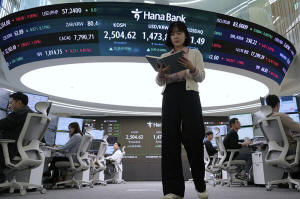World shares recover as markets waver under the threat of more tariffs
[April 01, 2025] By
ELAINE KURTENBACH
BANGKOK (AP) — World shares were mostly higher on Tuesday after U.S.
stocks swayed under the approach of President Donald Trump’s “
Liberation Day ” tariffs.
Gold rose to over $3,170.00 per ounce before falling back slightly.
Germany's DAX jumped 1.3% to 22,452.79 and the CAC 40 in Paris was up 1%
at 7,866.97. Britain's FTSE 100 gained 0.9% to 8,659.13.
The future for the S&P 500 was unchanged while that for the Dow Jones
Industrial Average lost 0.1%.
Instead of stocks, prices have been rising for investments considered to
be safer bets when the economy is looking shaky. Gold rose early Tuesday
to over $3,170.00 per ounce before falling back slightly.
Tokyo's Nikkei 225 was virtually unchanged at 35,624.48, as Prime
Minister Shigeru Ishiba said he was imploring Trump to not impose higher
auto tariffs on Japan, a longtime U.S. ally. A central bank survey found
a worsening in business sentiment among big manufacturers.
In Hong Kong, the Hang Seng rose 0.2% to 23,173.75, while the Shanghai
Composite index gained 0.4% to 3,348.44.
South Korea's Kospi jumped 1.6% to 2,525.44, while the S&P/ASX 200
surged 1% to 7,925.20.
Taiwan's Taiex shot up 2.8%, while the Sensex in India lost 0.2%.
Bangkok's SET advanced 1.1%.
On Monday, the S&P 500 rose 0.6%. It finished March with a 4.6% loss for
the first three months of the year, the worst quarter in two-and-a-half
years.
The Dow climbed 1% and the Nasdaq composite slipped 0.1%, pulled lower
by slides for Tesla, Nvidia and other Big Tech stocks.

Such neck-twisting turns have become routine for the U.S. stock market
because of uncertainty about what Trump will do with tariffs — and by
how much they will worsen inflation and grind down growth for economies.
Wall Street’s swings followed a sell-off that spanned the world earlier
Monday as worries built about the effects of the tariffs that Trump says
will bring manufacturing jobs back to the United States.
Wednesday, the United States is set to begin what Trump calls “
reciprocal ” tariffs tailored to match what he sees is the burden each
country places on his, including things like value-added taxes. Much is
still unknown, including exactly what the U.S. government will do on
“Liberation Day.”
[to top of second column] |

A currency trader passes by a screen showing the Korea Composite
Stock Price Index (KOSPI), top center left, and the foreign exchange
rate between U.S. dollar and South Korean won, top center, at the
foreign exchange dealing room of the KEB Hana Bank headquarters in
Seoul, South Korea, Tuesday, April 1, 2025. (AP Photo/Ahn Young-joon)
 If the April 2 tariffs end up being
less onerous than investors fear — maybe Trump includes no
additional tariff increases on China, for example — stocks could
rally. But a worst-case scenario could make businesses so fearful
they start cutting their workforces and stocks could sink much
further. And it's possible April 2 won't clear the uncertainty.
Even if Trump’s tariffs end up being less harsh than feared, the
lack of clarity might lead U.S. households and businesses to freeze
their spending, stifling the economy.
Tesla fell 1.7% on Monday to bring its loss for the year so far to
35.8%. It’s been one of the year’s worst performers in the S&P 500
in large part because of fears that the electric-vehicle maker’s
brand has become too intertwined with its CEO, Elon Musk.
Musk has been leading U.S. government efforts to cut spending,
making him a target of growing political anger, and protests have
swarmed Tesla showrooms as a result.
On the winning side of Wall Street was Mr. Cooper, which jumped
14.5% after the home loan servicer said it’s being bought by
mortgage company Rocket in an all-stock deal valued at $9.4 billion.
The deal comes just weeks after Rocket acquired real estate listing
company Redfin, and Rocket’s stock fell 7.4%.
Newsmax surged 735% in a dizzying first day of trading for the stock
of the news company. Its price was so volatile that trading of its
stock was briefly halted a dozen times through the day.
In other dealings early Tuesday, U.S. benchmark crude fell 19 cents
to $71.28 per barrel, while Brent crude, the international standard,
lost 18 cents to $74.59 per barrel.
The dollar fell to 149.57 Japanese yen from 149.97 yen. The euro
rose to $1.0820 from $1.0817.
All contents © copyright 2025 Associated Press. All rights reserved
 |